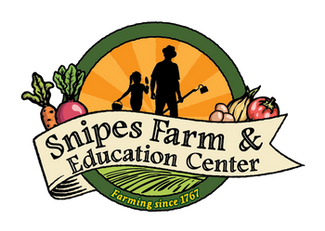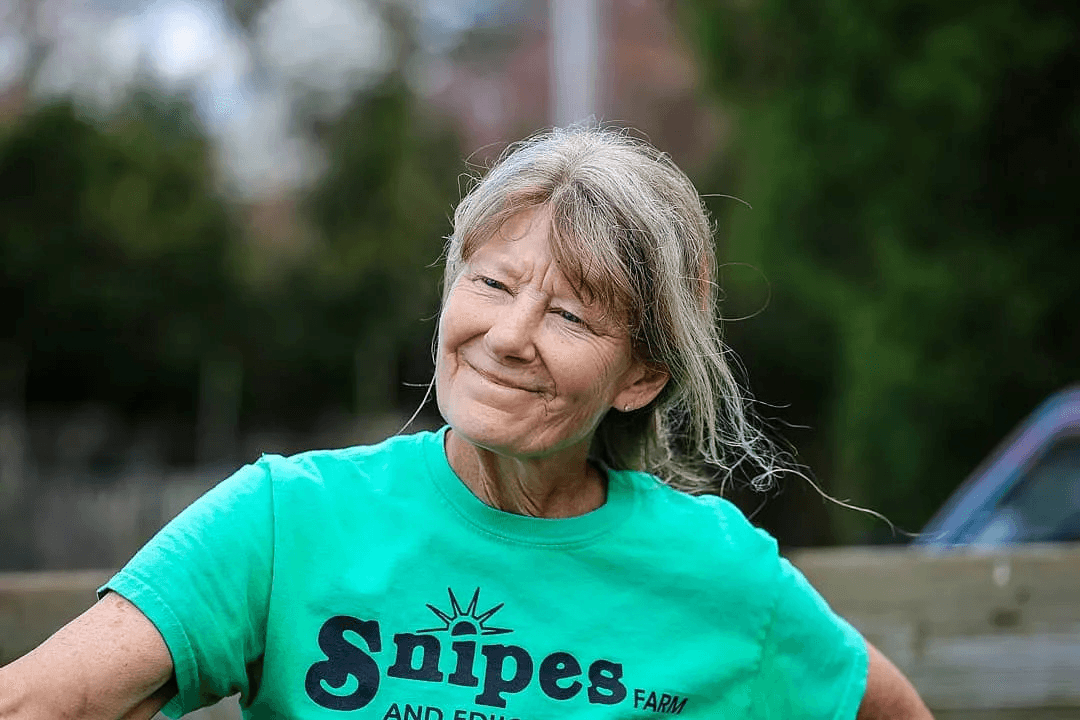
Raising Organic Vegetables is a Passion for Lower Bucks Farmer
The Snipes Farm Market and CSA Are Popular with Locals Who Enjoy the Quality and Variety of their Certified Organic Produce
Morrisville, PA
April 2022
Victoria Lautsbaugh opens a weathered plywood door and checks on her “children” lying peacefully in their dark warm beds.
She is raising plants from seed in trays of organic soil in a germination chamber. They have numbered in the millions under her care.
Soon they will sprout and grow names like lettuce, spinach, basil and cilantro. Then they will make their way to the fields or greenhouses to mature.
Many will end up at the Saturday Farm Market in the Big Red Barn at the Snipes Farm and Education Center in Morrisville, PA, where Victoria is director of farming.
She admits to feeling a special affection for them all. “I love growing plants,” she says on a recent spring morning, wearing blue jeans and an appropriately green t-shirt. “I am happy to grow any plant.”
The beneficiaries of Victoria’s loving attention are the local people who buy the produce at the Snipes Farm Market, open every Saturday from 9:00 am until 1:00 pm starting in May. They can also collect their share of produce twice weekly through a Snipes CSA membership.
Like other customers, Shellie Stoddard keeps coming back because she likes the high quality and variety of the farm’s certified-organic fruits and vegetables.
“I have lots of recipes for preparing meals with our share, and ideas to deal with excess tomatoes or zucchinis. We buy the egg share and the winter share and visit the farm market all through the winter to stock up on greens,” says Stoddard, a founding CSA member. A finance expert, she says this is the closest she will get to her dream of owning her own farm.
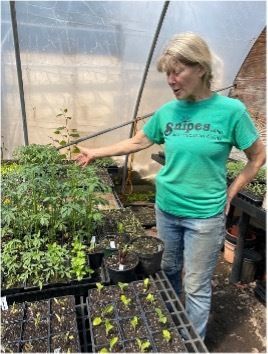
Certified Organic
Victoria has been instrumental in returning Snipes to vegetable production since 2003. She has a long and durable relationship with leafy green things, having graduated with a degree in horticulture from Penn State College of Agriculture in the 1970s.
When she says the Snipes Farm fruits and vegetables are organic, she isn’t making the same general claim that many farms make. That’s because Snipes Farm and Education Center is one of the few government-certified organic produce farms in the Lower Bucks County region. Many other farms sell “organic” produce, but the only true organic farms are the ones certified as such by the US Department of Agriculture.
That means they use no pesticides, no herbicides and no genetically modified seeds. They use organic compost to enrich the soil.
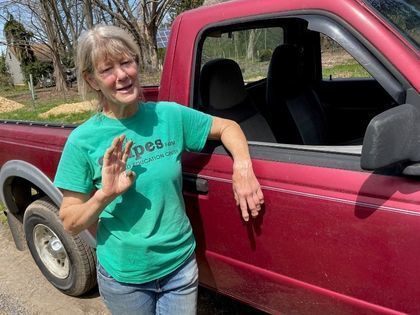
Director of Farming Victoria Lautsbaugh takes a break from her farming duties to talk to a reporter at the Snipes Farm and Education Center in Morrisville, PA.
Hunger Relief
After seeds have sprouted in the germination chamber, Victoria moves them to a “propagation house” to continue growing. Next, they are moved to the larger greenhouse, planted in a field or moved to one of three large “tunnels,” metal-frame greenhouses covered in thick, opaque sheets of plastic.
More than two-thirds of the produce grown at Snipes Farm is donated to hunger relief in Trenton, NJ, and other cities. The rest is sold at the Saturday Farm Market or through CSA memberships. CSA members pay an annual amount to have the farm provide them with a weekly portion (traditional CSA) or to make their own selection (Market Share CSA).
It isn’t just the certified-organic designation that makes Snipes Farm and Education Center special.
It also has a special and perhaps even unique mission among the many farms that dot the landscape in a county known for its “agri-tourism.” In line with the Quaker traditions of this 7th generation family farm, the Snipes family and its team of employees, volunteers and board members are also dedicated to community service and education.
This is most evident in their expanding hunger relief program, and in their farm-education camps for children and teenagers, with scholarships offered to kids whose parents cannot afford the camp fees.
They also share a strong commitment to protection of the earth in all of its natural glory, recognizing that this small blue-green planet will remain habitable only if we treat it with reverence.
Snipes Farm comprises about 160 acres of forest, wetlands and fields. About one third of the site, called Snipes Woods, extends on both sides of Route 13 north of Route 1. It’s a moist, mostly untouched coastal-plain forest, a designated ecosystem with a creek running through it.
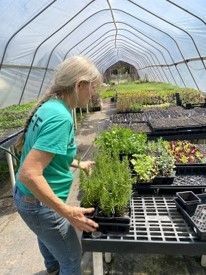
Victoria moves a rosemary plant in the larger of the two greenhouses, where plants can grow to maturity.
Back to the Earth
The Snipes Farm and Education Center mission statement sums up what this nonprofit is all about: To model and teach sustainable farming, while building community and reconnecting people to the land.
If Snipes Farm had a theme song, it might be “Back to the Earth.”
On this particular day, Victoria and the other farmers and farmers assistants could be found walking and driving this way and that. They have much to do as spring crops mature.
Too much rain has made the fields too wet to plough, but the early spring vegetables are thriving in the natural heat of the “tunnels,” modern, metal-frame greenhouses covered in sheets of opaque plastic.
In addition to lettuce, spinach, asparagus and kale, customers can buy Swiss chard, arugula, Asian greens, cilantro, beets, and Italian heirloom onions at this time of year. Not to mention scallions, radishes, turnips, Bok Choy and Chinese cabbage. Snap peas and sugar peas won’t be far behind.
And, of course, there are still plenty of sweet winter carrots to be had.
Winter carrots underscore a poorly understood fact about farming. The growing season doesn’t begin in spring and end in winter. It’s all year ‘round. It never stops.
“We’ve been selling fresh produce out of my tunnels all winter long,” Victoria says. “We’ve been working all winter.”
Like all good farmers, she rides the unpredictable ups and downs of the seasons – too much rain or too little, too cold or too warm – with a philosophical attitude. Some plants don’t make it, but most do.
Victoria enters one of the three growing tunnels to show off some thriving crops.
“These are snow peas. The first half are snow peas, and the other half are snap peas,” she says with a sweep of her arm down a long row of peas. “When they’re ready, they are going to market. We’ve got cilantro right here in front of them. They will be climbing this trellis to the very top.”
As she exits the tunnel, she is careful to replace a trellis-like barrier, put in place to prevent a fat groundhog from dining on the tender pea plants. He likes what he finds, and it’s easy to see why.
